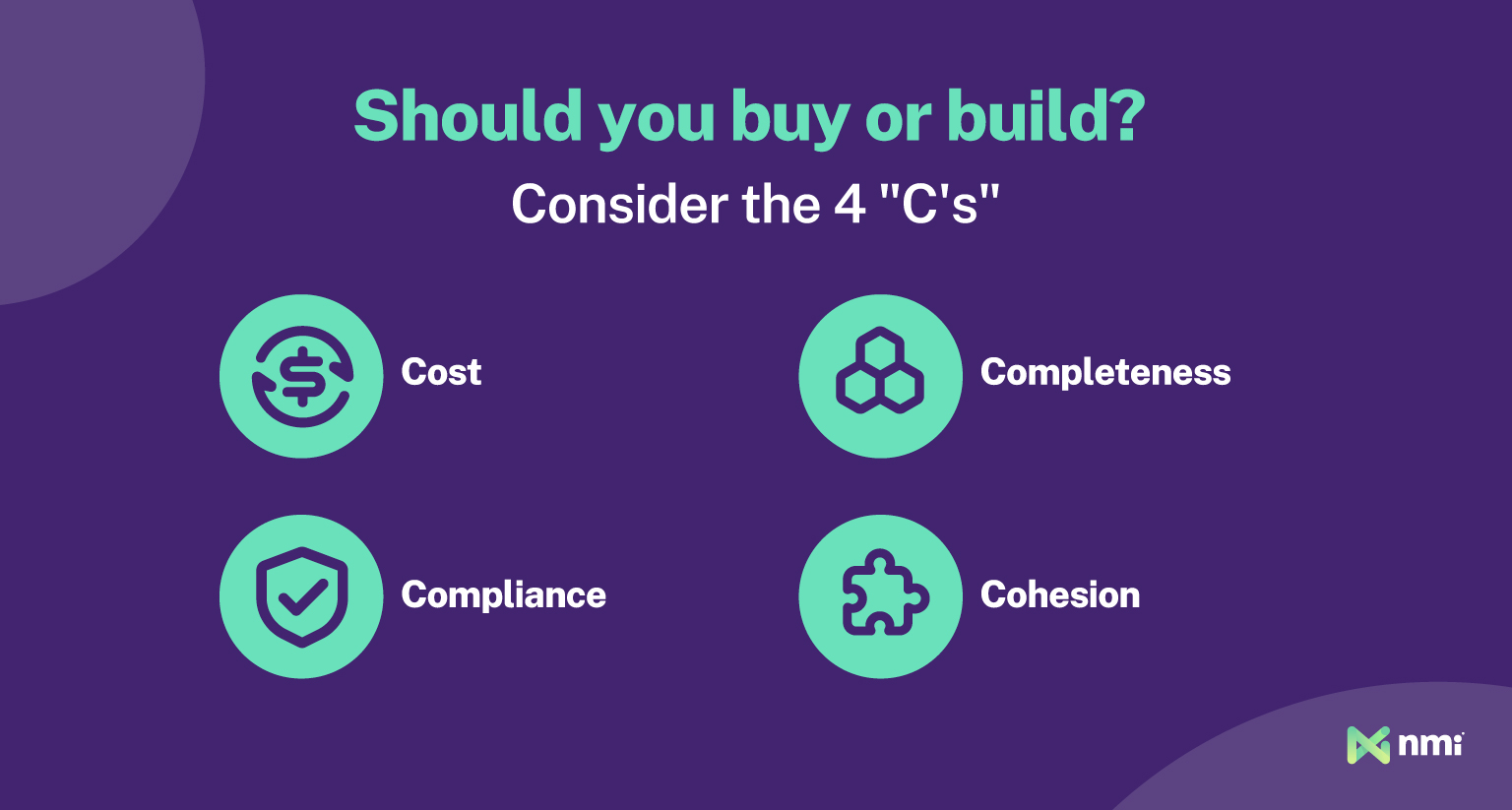Should you build or buy a customer relationship management (CRM) platform for your payments business? That’s a question you’ll likely run into at some point during your company’s growth, especially as the limits of generic CRM systems become more apparent.
Unfortunately, there’s no simple answer. Building allows you to custom design a solution ideally suited to your individual needs. Buying is simple and easy. To determine the best path for your business, you’ll need to analyze and balance the various benefits and drawbacks of each. Let’s take a look at the four key factors you’ll need to weigh when making this decision.
The “Four C’s” To Consider When Deciding Between Build vs. Buy
Generic CRM platforms often do so many general tasks that they’re difficult to learn and work with. But they also do so few industry-specific tasks that they ultimately don’t do enough. That double friction leads many payment companies to eventually hit a wall with generic solutions and consider going the custom route.
Depending on your size, your portfolio makeup, your business model and your internal experience, building a custom payments CRM may be the right choice for you. But it’s important to carefully weigh the upsides against the challenges that come with in-house development.
To get a clearer picture of which route is best for your company’s unique needs, you can examine the “Four C’s” of the build versus buy decision for payments CRMs: cost, completeness, compliance and cohesion.
Cost
The first big factor when considering build versus buy is the cost. Custom building a payments CRM is a very costly and time-consuming proposition that puts a big burden on your internal development team. Maintenance, updates and ongoing security also fall on your shoulders with a custom build. Or, if you don’t have an internal development team, you’ll need to contract an outside firm to do the custom work for you — an even more expensive proposition.
Those upfront and long-term costs have to be weighed against the cost of an off-the-shelf solution. It’s important to remember that while off-the-shelf CRMs are vastly cheaper upfront, to make an accurate comparison, you need to forecast the long-term cost of your subscription for as long as you think you’ll use the system. When viewed over longer time frames, the two estimates may start to get closer than you’d expect.
Completeness:
The pain point driving you to consider a scratch-built payments CRM is likely a mismatch between your needs and the features you’re used to seeing in off-the-shelf solutions. Generic CRMs are designed to appeal to the widest possible market, and they’re often a very poor fit for companies in a unique industry like payments — especially when it comes to things like merchant management, residuals management and reporting. The big-name players offer enormous platforms packed with features — just not the ones you need.
Building your own payments CRM enables you to design your feature set to ideally match your company’s needs. That offers some clear upsides, but there are also some pitfalls. Most notably, it’s easy to build a solution that suits your business now, but that doesn’t mean it’ll be ready to scale as you grow and your needs change.
For instance, you may not need rapid onboarding or underwriting integration now, but you might in a few years when you’re significantly bigger. Or the way you generate earnings from payments may evolve alongside your business. As this happens, comprehensive residuals management and reporting will become more important. But, adding these types of major functions as you go can require expensive rework.
An alternative option is a payments-specific off-the-shelf CRM. Payments-specific CRMs are robust and feature-rich, but, unlike the big generic systems, every feature has been carefully designed to enhance merchant management and serve the unique needs of a payments company, regardless of its size or business model. That offers a mix of completeness and flexible, long-term utility that can be a major challenge to do in-house.

Compliance
The payments space is a favorite target for cybercriminals and fraudsters, and a business’s success depends on their compliance with the regulations and security protocols put in place by governments and card networks.
At a minimum, your payments CRM will need to be compliant with the Payment Card Industry Data Security Standard (PCI DSS). That requires your team to have specific knowledge to ensure every necessary box is checked. Your system will also need to undergo regular security updates, penetration testing and recertification. All that can be a major burden thanks to the complexity of the payments threat environment.
On the other hand, if you choose an off-the-shelf solution, you may be able to shift the vast majority of the CRM security burden to your partner. That may not be true of generic solutions, but it’s a huge benefit offered by payments-specific CRMs, where it’s your partner’s job to understand the intricacies of payments security and to continuously maintain compliance with all relevant regulations and requirements.
Cohesion
Your CRM is a critical part of onboarding and merchant management. But it’s still just one part of your overall payments tech stack. You can use application program interfaces (APIs) or tools like Zapier to connect a custom-built CRM to your other software platforms, but that will always be an unoptimized solution that slows down processes and introduces friction for your employees.
On the other hand, getting a CRM solution from your payments partner can give you turnkey access to a system built for seamless integration with the rest of your payments stack. Everything from automated underwriting tools and processor connections to value-added merchant services and robust residuals management and reporting will seamlessly integrate with your CRM right out of the box. This creates a more holistic experience that makes selling payments and serving merchants easier and more profitable.
Getting Started With the Right Payments CRM
If you land on the “buy” route, finding the right off-the-shelf solution is key to maximizing your return on investment and getting the most from your new technology. And, if you’re operating in the payments space, there is no better choice than NMI Merchant Central.
NMI Merchant Central is the most complete payments CRM available today. It’s designed to tackle all the most important operational tasks involved in selling payments, from sales to onboarding to residuals management and beyond. It’s also designed to be flexible, ensuring it can serve you better than any generic CRM no matter how you sell payments. Lastly, it will scale with you seamlessly as you grow and your needs change.
Just some of NMI Merchant Central’s major benefits include:
- Better lead and merchant management that helps you deliver more personalized, more effective sales and ongoing service
- Faster onboarding that reduces errors and cuts a 30-minute task down to five minutes or less
- Automated residuals that eliminate manual calculations and help you pay out stakeholders faster
- Smarter decision-making thanks to easy-to-access, fully customizable reporting on your portfolio and all your merchants
- Frictionless integration with the rest of the NMI ecosystem, including ScanX automated onboarding, the NMI Gateway, value-added services and more
- Simplified compliance thanks to full PCI Level 1 certification and one of the industry’s most experienced security teams
- Fast, effortless integration with your existing tech stack and daily operations
To learn more about how easy and cost-effective it is to plug the industry’s most powerful CRM into your payments business, reach out to a member of our team today.
Not ready to chat? Explore Merchant Central’s payments CRM on your own with our virtual demo.





